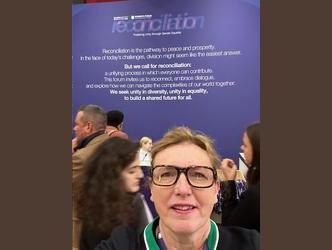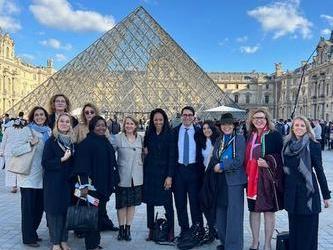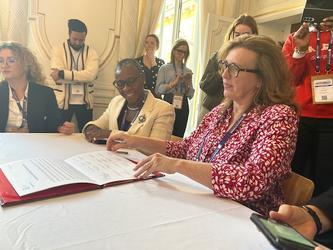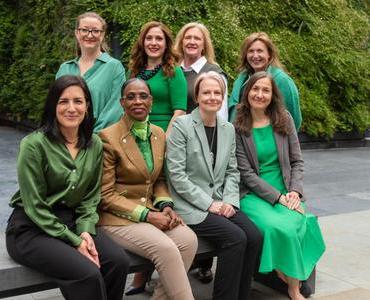In a guest blog for the Bar Council, Tana Adkin KC shares highlights from the Women's Forum.
The drive for women’s equality is not just about equity, it is vital right now in our politically polarised and troubled world as a pathway to economic growth and global peace.
That fact is no longer controversial - the economic, social and environmental benefits of womens’ equality have been known for some time. Research from the IMF suggests that narrowing the gender gap in labour markets could increase GDP in emerging markets and developing economies by almost 8%, gains from fully closing the gender gap would lift GDP in those countries by 23%. The European Central Bank suggests that firms led by women have higher environmental, social and governance scores improving profits. Greater gender balance on bank boards matches with greater financial stability and better performance.
Its simple - mobilising all available talent maximises creativity and productivity.
The UN report, Progress on the Sustainable Development Goals: The Gender Snapshot 2024, published in September 2024 confirmed the goal for gender equality is not being met. One in four girls continue to be married as children. The annual global cost of countries failing to adequately educate their young populations is over USD 10 trillion. Low to middle income countries can lose another USD 500 billion in the next five years by not closing the digital gender gap. Countries with domestic violence legislation are shown to have lower rates of intimate partner violence and wider benefits flow.
We now need men and women together to get gender equality moving.

Attending the global meeting of the Women's Forum in Paris at the end of October was both a wake up call and a humbling experience. I met delegates and speakers who thought beyond the benefits of gender equality, sharing ideas about effective individual and collective action. Also hearing about the experiences and suffering of women right now in 2024 simply because they were born female was agonising. The strength and resilience on show was incredible.
Right now it is estimated it will take another 131 years before women reach equality, according to the Global Gender Gap Report 2023 published by the World Economic Forum - this is beyond my lifetime and the lifetime of my daughters. The theme of the opening speech at the Women's Forum was reconciliation, Nannette LaFond-Dufour the President of the Women's Forum, established a collaborative atmosphere with delegates introducing themselves to each other. Recognising the past assignment of roles based on sex, patriarchal systems and adversarial processes in politics and economics that have lead to conflict and hardship, she told us "The word reconcile comes from the Latin to assemble, convene or unite, to make things good again, to repair". She urged us to recognise, despite the challenges our world faces, different points of view that can be mutually enhancing.
We were being called on to join a new social construct and contract with the world, to work for peace and prosperity where women exercised a choice and took their place as leaders. Progress in the corporate world was acknowledged but it was too slow “because for time, the evolution of womens’ rights is the slowest transition in the history of humanity.”
Around the world access to education, university, religion, health, income, children, leisure, fitness and to gender identity were being restricted simply based on being born female. We were all encouraged to "dream big" over the two days of the conference.

The President of the French National Assembly, Yael Braun-Pivet began by quoting from Winston Churchill, and said: "an appeaser is one who feeds a crocodile hoping it will eat him last”. Adding that people preferred revolution to reform and compromise, and in these times of fragmentation and polarisation in politics particularly, it was understandable that we would be sceptical that reconciliation could work. She went on to describe herself as an optimist and pointed out whilst the political groups in the French National Assembly often disagreed they could unite around the common good such as the Paris Olympic Games and womens’ biological rights. She considered her role was to bring consensus and advocate for more women in municipal councils and in every City, “this is justice not feminism” she said. She also pointed out that the participation of women in diplomacy increases the chance of reaching consensus, yet only one in 10 diplomats are women. She concluded by asking us not to doubt the capacity of the French people to reconcile, they were not daydreamers and trust womens’ leadership and take courage.
Syabulela Mandela, grandson of Nelson Mandela, told us he was tempted to give a historical account of human civilisation including the results of conflict in Sudan, Ethiopia, Israel, Palestine, Russia and Ukraine. “We can hear the screams of children on our television while the rest of the world applauds injustice”, he said. He gave us the example of women he has met who have been taken by ISIS, bearing children from rape, whose communities will not accept them back with those children and the difficult choices they have to make for their children. He also turned to the example of South Africa, the leadership of Nelson Mandela and the search for common ground. “Mandela said having climbed the mountain you realise there are many more mountains to climb … the violence in conflict zones around the world are the mountains presented to us to climb.” The 100 years of violence and apartheid in South Africa appeared impossible to resolve until it was done and he appealed to the younger generation to start thinking about how best to find common ground. “What future do we want … the fruits of peace and democracy. What did you do to prevent injustice and violence in the world? It is possible to reach compromise, that is the lesson South Africa can present, there is nothing to gain in pursuing an adversarial path and so much to gain if we can come together and engage in dialogue.”
At the conference we also heard the results of the French IPSOS survey of 3,500 respondents in G7 countries showing increasing recognition of gender inequality but there were still deeply entrenched views about gender stereotypes: 74% had witnessed sexist behaviours in the workplace and half of the women surveyed had experienced disadvantage at work due to their gender. Gender parity in senior management was increasing but very slowly and women were severely underrepresented in AI and technology roles. Women were more likely to be affected by climate change, 80% of the people displaced by climate change were women or girls, but made up only 19% of heads of delegations at COP28. Women are also more likely to suffer from medical negligence (71%). Indicating an appetite for change, the majority of those surveyed (78/86%) favoured coercive measures to reduce the pay gap between men and women, and 70% favoured quotas for men and women in leadership roles connected to energy and climate action.
Silvana Koch-Mehrin, President of Women Political Leaders, Shelly McKinley, VP of Microsoft & GitHub, and Mona Sinha Global Executive Director for Equality Now all lead a session on the role for women in fuelling healthy democracies. Less than 10% of heads of government are women. But where women are in politics they drive changes in policy that benefit everyone. The recent focus on addressing gender-based violence across a number of countries had been women-led but the results benefit all. The need for more women to enter politics was very stark, Mona suggested that we need more sustainable and safer economies that care about our children and our families. IMF data shows that women in leadership positions brought reconciliation and the end of violence in war zones that was both faster to achieve and lasted 15 years longer. Increased violence in the digital space was a dangerous phenomenon with online bias settling itself in an unregulated world supporting negative gender-based stereotypes. Fake voices, fake videos and online misogyny was showing an increased resistance to womens’ leadership and is making sexism acceptable.
Challenging stereotypes isn’t just a womens’ problem – building a better future is reliant on male championship and ally-ship. Coalitions of men and women working together brings change. One example given was from one of the few women leaders in Jordan, she was able to build a consensus with the King and other male voices to change the law on women having to marry their rapist. The final message from the panel was for women to consider going into politics to make a difference.
We were fortunate to hear from Maria Corina Machado, the leader of the Venezuelan opposition, speaking to us online whilst in hiding. She explained how the electorate had demanded a country that their children could return to, a democracy free from violence and intimidation and that was what the citizens had voted for. Despite the opposition winning the election, the current dictator has refused to accept defeat, increased repression and threatened violence. She said this was out of a fear of losing power and the opposite of listening to the will of the people. She was formidable.
Karen Mundane, the CEO of Reconciliation Australia spoke from the perspective of her work in Australia. She explained the work carried out on community engagement, advocacy and dialogue that has been necessary to address the conflict over land ownership.
Fawzia Koofi, President of Women for Afghanistan, spoke movingly about the cancelling of women's human rights in Afghanistan and particularly that all women and girls in Afghanistan have had the right to education withdrawn. The situation in the country is now worse than before the war for women in Afghanistan. At one point when she was on the panel, she reacted as a photographer ran down the gangway towards her, she said that she had anticipated an acid attack or other violence as she is under threat for speaking out.

As part of the conference I was invited by the Paris Bar to join with other women Bar chairs, past and present, to sign a declaration of intent on the 24 October 2024. The declaration calls upon all women leaders in law to promote dialogue and action, to strengthen collective experience and best practice that promotes gender equality, ensure AI technology strengthens womens’ rights and that future generations of women have unrestricted access to the positions they aspire to. Equal respect and equal dignity for all. The “batonnieres du monde” will meet next year to share how individual Bars are making progress and addressing gender equality.

I myself, finding renewed gumption, am standing for election as a Common Councillor for the Castle Baynard ward in the City of London. I am running alongside seven other women. We hope to channel the nerve and courage of early Britons calling ourselves the Iceni Tribe but we will employ dialogue, diplomacy and collaboration if we are elected. We are determined, as women, to improve things for all workers and residents that live and work alongside us. I would encourage all women to find their own opportunities to become a leader and make it so that future generations of women can also find and take their place in an equal and equitable society.
Tana Adkin KC is Deputy Head of Chambers at 15NBS Chambers, former Chair of the Criminal Bar Association (CBA) and happens to be a woman.